The AMD 2nd Gen Ryzen Deep Dive: The 2700X, 2700, 2600X, and 2600 Tested
by Ian Cutress on April 19, 2018 9:00 AM ESTCPU Legacy Tests
Our legacy tests represent benchmarks that were once at the height of their time. Some of these are industry standard synthetics, and we have data going back over 10 years. All of the data here has been rerun on Windows 10, and we plan to go back several generations of components to see how performance has evolved.
All of our benchmark results can also be found in our benchmark engine, Bench.
3D Particle Movement v1
3DPM is a self-penned benchmark, taking basic 3D movement algorithms used in Brownian Motion simulations and testing them for speed. High floating point performance, MHz and IPC wins in the single thread version, whereas the multithread version has to handle the threads and loves more cores. This is the original version, written in the style of a typical non-computer science student coding up an algorithm for their theoretical problem, and comes without any non-obvious optimizations not already performed by the compiler, such as false sharing.
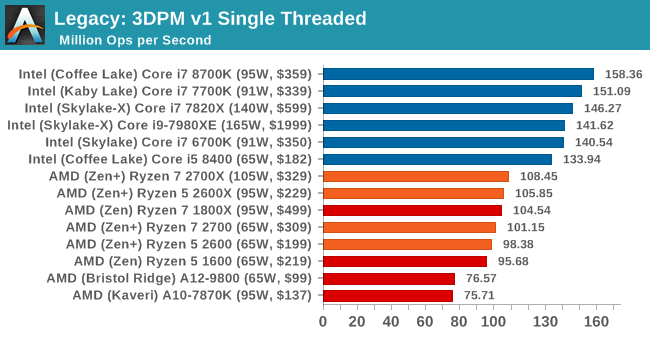
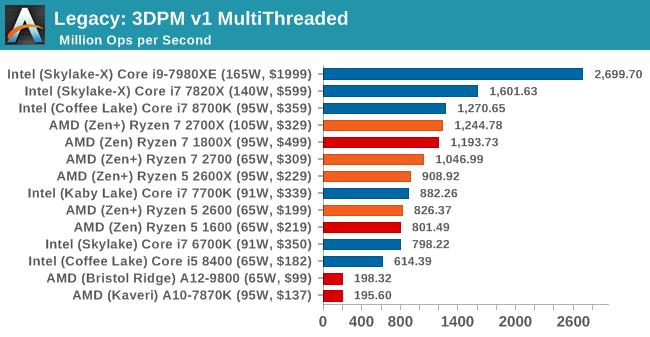
CineBench 11.5 and 10
Cinebench is a widely known benchmarking tool for measuring performance relative to MAXON's animation software Cinema 4D. Cinebench has been optimized over a decade and focuses on purely CPU horsepower, meaning if there is a discrepancy in pure throughput characteristics, Cinebench is likely to show that discrepancy. Arguably other software doesn't make use of all the tools available, so the real world relevance might purely be academic, but given our large database of data for Cinebench it seems difficult to ignore a small five minute test. We run the modern version 15 in this test, as well as the older 11.5 and 10 due to our back data.
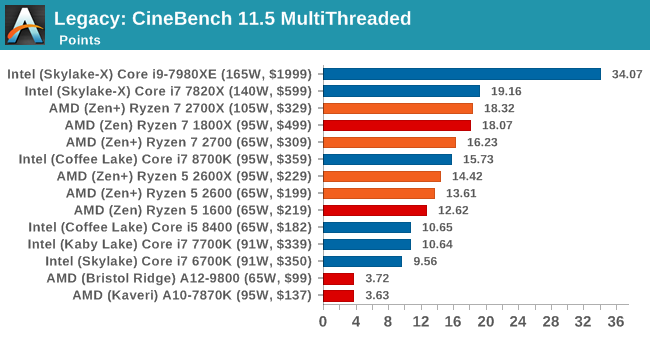
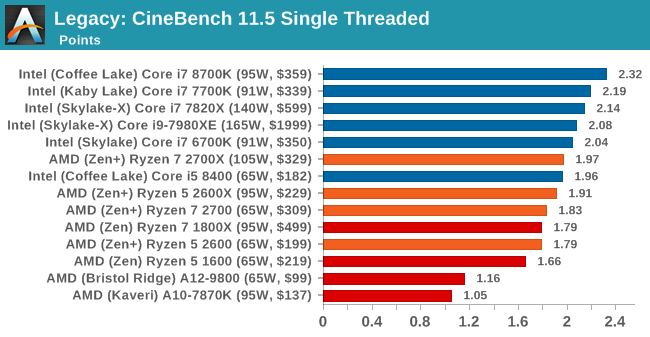

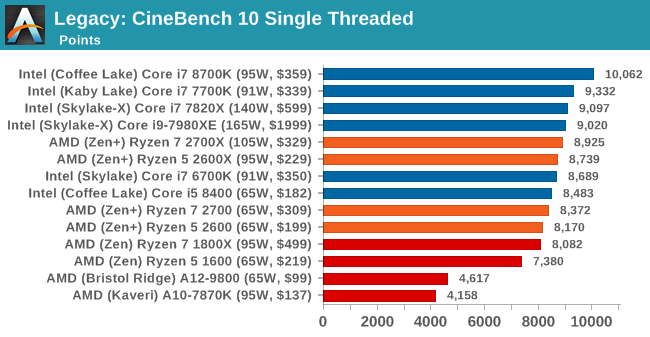
x264 HD 3.0
Similarly, the x264 HD 3.0 package we use here is also kept for historic regressional data. The latest version is 5.0.1, and encodes a 1080p video clip into a high quality x264 file. Version 3.0 only performs the same test on a 720p file, and in most circumstances the software performance hits its limit on high end processors, but still works well for mainstream and low-end. Also, this version only takes a few minutes, whereas the latest can take over 90 minutes to run.
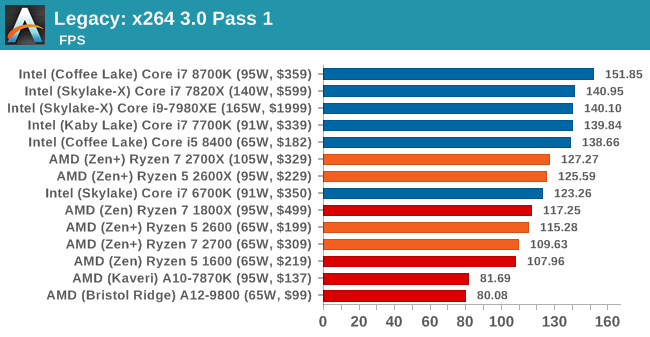
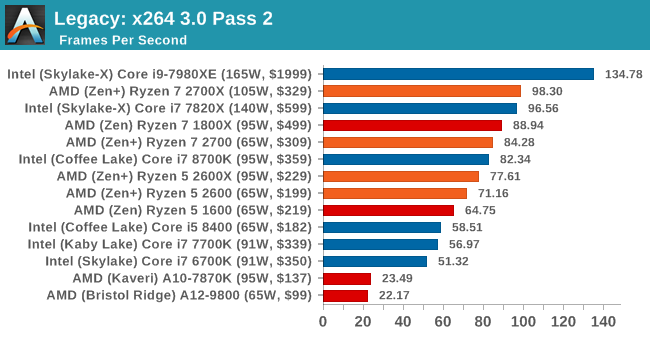










545 Comments
View All Comments
eek2121 - Thursday, April 19, 2018 - link
Their benchmarks are garbage? You are welcome to buy a 2700X and test for yourself. The benchmarks they used are built in for the most part to each game. It coincides pretty much with what I know of Ryzen, Coffee Lake, and Ryzen 2xxx.AndersFlint - Thursday, April 19, 2018 - link
While out of respect for the reviewer's hard work, I wouldn't describe the results as "garbage", they certainly don't match up with results from other publications.ACE76 - Thursday, April 19, 2018 - link
Yes, Anandtech's are honest and objective...I believe Tech Radar was comparing Coffee Lake OC'd to 5.2ghz vs Ryzen 2700x at 4.1ghz...the stock turbo alone hits 4.3ghz...they are slanting to benefit Intel...a 5.2ghz stable overclock on Coffee Lake alone is very hard to achieve and maybe 10-15% of CPUs can do it.Luckz - Monday, April 23, 2018 - link
I haven't really heard of anyone unable to reach 5 GHz.SkyBill40 - Thursday, April 19, 2018 - link
Well, golly gee... did the other reviewers use the *exact* setup as used here? No? Hmm... I guess that then makes your grouchy mcgrouchface missive not worth consideration then, no? If anyone is to not be taken seriously here, it's you.Typical ad hominem and burden of proof fallacies. Well done, Chris113q.
Flying Aardvark - Thursday, April 19, 2018 - link
WRONG. AT has it right, these are properly patched systems. Heavy IO perf loss with Intel Meltdown patches has been well known for months. See top comment here. https://np.reddit.com/r/pcmasterrace/comments/7obo...Prove your claim that the data is incorrect or misleading in any way whatsoever, child.
RafaelHerschel - Thursday, April 19, 2018 - link
One of the problems is that other reviewers see a less pronounced difference between the new AMD Ryzen CPU's and the older ones. Most reviewers claim that they have tested with all available patches in place.Your conclusion that AT has it right is based on what? Your belief that AT can't make mistakes? Maybe there is a logical explanation, but for now, it seems that AT might have done something wrong.
Flying Aardvark - Friday, April 20, 2018 - link
I have evidence to backup my claim, users with no motivation to mislead agree with AT, and did months ago. You have no evidence, simply butthurt. Good luck.boozed - Thursday, April 19, 2018 - link
Let's ask a total jerk from the internet what he thinks.aliquis - Thursday, April 19, 2018 - link
They definitely used slower memory. Don't know if that's the thing. Don't know what fps others get in the same games and settings. Otherwise maybe it's ASUS doing special tricks like with MCE before or have better memory timits or can use some trick to get similar of precision boost overdrive already. Or a software mistake.Sweclockers is the best for game performance. They do 720p medium so the gpu limits will be smallest there.